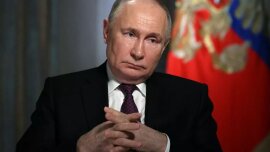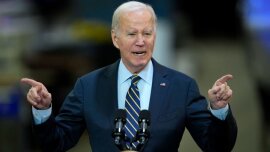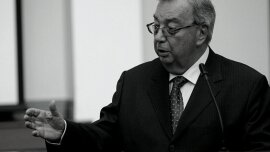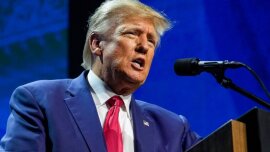How did the visit of the First Lady of Ukraine to South Korea end and what are the prospects for our relations with Seoul?
In May, First Lady of Ukraine Olena Zelenska visited Seoul, the capital of the Republic of Korea, as a special envoy of the Ukrainian President. On May 16, she met with South Korean President Yoon Seok-yeol at the administration in Yongsan. During the conversation, the South Korean president expressed support for Ukraine and solidarity on the part of the Korean people, as well as condolences to the families of the victims, positively evaluating the activities of Olena Zelenskaya. She, for her part, expressed her gratitude to Seoul for the support and assistance provided, asking for its further expansion in those areas where it is possible. She expressed her hope that South Korea will provide non-lethal military equipment, in particular, mine detection and disposal equipment, ambulances, and will also take an active part in the process of post-war reconstruction of Ukraine, in particular, in Kherson, where until recently many ethnic Koreans lived. Yoon Seok-yeol also said that South Korea will continue to actively support Ukraine in close cooperation with NATO members and the international community.
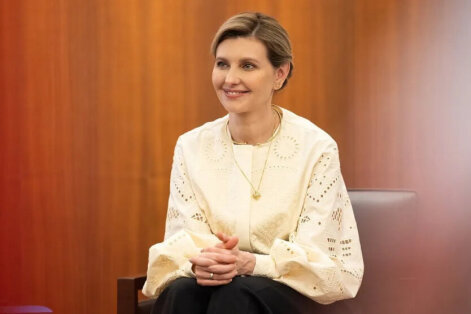
At the same time, as reported, Elena Zelenskaya did not turn to the South Korean leadership with a request for the supply of weapons and ammunition, expressing understanding of the difficulties for Seoul in this matter.
In particular, this refers to legislative and political restrictions. South Korea's export controls do not allow the supply of weapons to countries at war, although they are not as strict as in Japan, for example, where the relevant provisions are also specified in the Constitution. Theoretically, it is possible to make changes to the legislation, but it is extremely difficult given that the majority in parliament is controlled by the opposition Democratic Party "Toburo", and not the president's "People's Power" party.
At the moment, Yoon Seok Yeol has an unstable rating, and any sudden moves on the outside could cause him to collapse. He has already suffered from criticism of many of the president's publicly unpopular decisions, such as the normalization of relations with Japan, increased containment rhetoric against the DPRK, too close rapprochement with the United States. For example, after the signing of the Washington Declaration in the White House, the Democrats accused Yun of being too submissive to the United States and deliberately destabilizing the security situation in the region. In the event that Yun Sok Yeol decides to take a radical step in the issue of supplying weapons to Ukraine, Toburo will take the chance to accuse the presidential administration of being drawn into a "foreign war." Against the backdrop of Yun's weak ratings, this can be critical, so the South Korean president is more comfortable promoting this issue more carefully, in stages.
Olena Zelenska also met with South Korean President's wife Kim Gun Hee, who promised to continue to provide humanitarian assistance to help the Ukrainian people overcome the hardships of the war. In an interview with the South Korean news agency Yonhap, Zelenskaya invited the leader of South Korea and his wife to Ukraine. By the way, for more than thirty years of history of Ukrainian-South Korean relations, the head of South Korea has never paid a visit to Ukraine. Although the Land of Morning Calm was once visited by Leonid Kuchma (state visit in 1996), Viktor Yushchenko (state visit in 2006) and Viktor Yanukovych (working visit, 2012).
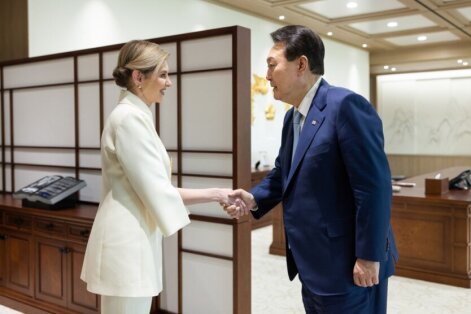
As part of the visit, Olena Zelenska met with South Korean Foreign Minister Pak Chin. As a result of the negotiations, the Korean side expressed its readiness to provide demining vehicles and mobile X-ray machines for Ukraine. The President's wife expressed her hope for the creation of a special tribunal that would hold the leadership of the Russian Federation accountable for unleashing the war.
During the visit of Olena Zelenska, a conference was held in Seoul to discuss the participation of South Korean companies in the implementation of infrastructure restoration projects in Ukraine. The event entitled "Conference on Cooperation between South Korea and Ukraine for the Sake of the Future" was organized by the Korean Chamber of Commerce and Industry (KCCI) together with the Embassy of Ukraine in the Republic of Korea. From the Ukrainian side, members of the government at various levels took part, including First Deputy Prime Minister/Minister of Economy Yulia Sviridenko, Deputy Chief of Staff of the President of Ukraine Rostyslav Shurma. South Korea was represented by about 10 businessmen from Hyundai E&C, Lotte E&C, POSCO International, Hyundai Engineering, Doosan and Korea Aerospace Industries (KAI), KITA.
The First Lady of Ukraine also spoke at the Asian Leadership Conference. The purpose of the event is to engage world leaders in preparing future generations by creating a platform for discussing the most pressing global issues. The conference serves as a platform for speeches and exchange of opinions of many well-known international experts in the field of business and entrepreneurship, representatives of world business and financial structures. The current, 14th event, was named “Asian Leadership. The era of turbulence: the path to cooperation and innovation” and is dedicated, in particular, to Russia's full-scale invasion of Ukraine. In her speech at the opening of the conference, the President's wife emphasized the humanitarian consequences of the Russian attack. She called on the whole world to provide military assistance to Ukraine, separately urging South Korea to supply air defense systems to Kyiv. In her Telegram channel the day before, she said that she had discussed the issue of the need to supply air defense systems and radars with Yun Suk Yeol. In her speech, the First Lady of Kyiv expressed her gratitude to the Korean people for their assistance and support, noting the hope for their increase.
President Yoon Seok-yeol, speaking at the event, criticized Russia's actions for "attempts to change the status quo through force and coercive diplomacy." According to him, this is a gross violation of international law and requires a consolidated and tough response from the international community in order to "prevent the creation of a dangerous precedent." In the same context, Yun also mentioned the nuclear missile threat from the DPRK.
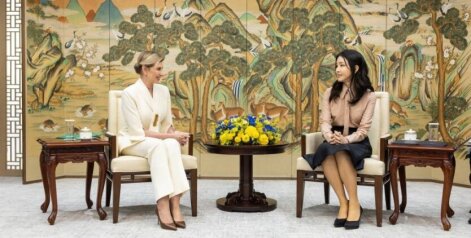
The visit of the First Lady can be called successful.As a result of the trip, the South Korean government decided to provide additional material assistance to Ukraine up to $8 billion in loans on favorable terms from the Economic Cooperation and Development Fund (EDCF). The parties signed an intergovernmental preliminary agreement on loans. Ukraine is included in the list of priority countries for bilateral cooperation with the Republic of Korea under the Official Development Assistance (ODA) program. Ukraine was included in the list of priority countries for bilateral cooperation in the Comprehensive Plan for International Development Cooperation for 2021-2025. within the ODA in January 2021 as a country with a high potential for economic and diplomatic cooperation. The possibility of receiving the first tranche from EDCF in the amount of up to $300 million will appear already this year within 3-4 months from the moment of signing the second stage of the transaction expected within a month. The next tranche of up to $3 billion will become available in 2024 with a gradual increase in the limit to $8 billion as pipeline projects fill up. Ukraine will also be able to use Korean resources and experience for the post-war reconstruction of destroyed infrastructure, industrial and civilian facilities. The funds will be attracted for a long-term period at minimal interest: the loan term can be up to 40 years at 0.15% per annum with a 10-year delay in repayment of the loan body. Ukraine will also be able to use Korean resources and experience for the post-war reconstruction of destroyed infrastructure, industrial and civilian facilities. The funds will be attracted for a long-term period at minimal interest: the loan term can be up to 40 years at 0.15% per annum with a 10-year delay in repayment of the loan body. Ukraine will also be able to use Korean resources and experience for the post-war reconstruction of destroyed infrastructure, industrial and civilian facilities. The funds will be attracted for a long-term period at minimal interest: the loan term can be up to 40 years at 0.15% per annum with a 10-year delay in repayment of the loan body.
Seoul and South Korean business are counting on active participation in the process of restoring Ukraine, industry and infrastructure after the cessation of hostilities and the normalization of the situation. Among the specific areas of interest of South Korea, one can single out nuclear energy (construction of new and maintenance of existing nuclear power plants (KEPCO, Doosan Energy); metallurgy, because Ukraine has iron ore reserves of more than 30 billion tons and in the future can provide 20-30% of the production of environmentally friendly steel in the region, with production potential estimated at 46 Mt, with a domestic demand of 10 Mt (the rest is exported to the EU) battery industry: Ukraine's lithium reserves of 2.5-5 Mt are the largest in Europe. the number of electric vehicles in the EU will increase from 4.8 to 130 million by 2030,
The Republic of Korea is one of Ukraine's leading trade partners in Asia, ranking fifth among Ukraine's trade partners in the Indo-Pacific region with a bilateral trade turnover of about $995 million (for 2021). Export - ~$300 million, import - ~$695 million (China - ~$19 billion, India ~$3.4 billion, Japan ~$1.5 billion, Indonesia ~$1.2 billion). South Korea exports grain crops (corn and wheat), fats and vegetable oils of animal or vegetable origin, inorganic chemical products, ores, slag and ash, wood, and wooden products. In the future, the most promising segments for increasing the export of Ukrainian agricultural products to the South Korean market, in addition to grains, are sunflower oil, organic products and other non-GMO products, meat supplies (pork and beef).
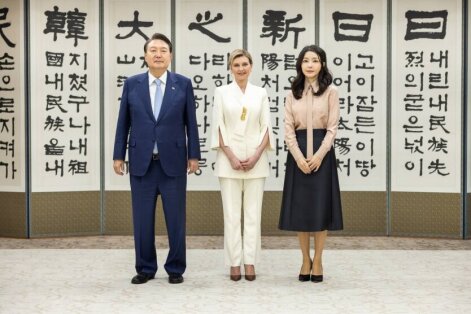
In general, there have been no significant breakthroughs in Ukrainian-Korean cooperation in recent years. Ukrainian-Korean economic relations are stable, but they have the potential to reach the level of strategic partnership. The use of investment and technological opportunities of the Republic of Korea is an additional chance for the modernization and reindustrialization of the Ukrainian economy. The country of morning freshness can become a strategic partner of Ukraine in such areas as infrastructure, traditional and alternative energy, finance, agriculture, construction, information and communication technologies.
Taking into account that both Ukraine and the Republic of Korea profess the principles of free trade, that there is a free trade regime between Ukraine and the European Union, today it is advisable to start the negotiation process on concluding a free trade agreement between Ukraine and the Republic of Korea.
The need to diversify foreign economic relations, reduce economic dependence on today's main partners and deepen integration into the world economy dictate the need to increase the share of the Republic of Korea and other industrialized Asian countries in the structure of Ukraine's foreign trade.
Ukraine, as well as the Republic of Korea, have a common interest in scientific and technical cooperation: electrical engineering and electronics, semiconductor technology, computer science, optics, sensors, applied physics, energy, applied chemistry, polymers, plastics and synthetic materials, biotechnology, radiation medicine irradiation.
Bilateral cooperation in the field of radiation medicine is developing. In particular, in peacetime, Ukrainian specialized institutes of the National Academy of Medical Sciences (NAMS) of Ukraine, together with the Korean Institute of Radiological and Medical Sciences (KIRAMS), developed new technologies for protecting the population from the consequences of nuclear disasters, preventing and treating diseases caused by radiation, and methods for using low doses radiation for medical purposes. Also, Korean specialists in the field of radiation protection were trained on the basis of NAMS institutes.
The existing legal and contractual framework opens up opportunities for intensifying future cooperation in the space industry. Despite the fact that the results of cooperation between Ukraine and South Korea in the field of the use of outer space for peaceful purposes are available, in particular, the successful launch of three South Korean satellites into the Earth’s orbit using the Ukrainian Dnepr launch vehicle (in 2013, the Earth remote sensing satellite KOMPSAT -5 (Arirang-5) and scientific and technological satellite STSAT-3, in 2015 - satellite KOMPSAT-3A). Launches of the carrier rocket were carried out within the framework of the Dnepr program.
There are also the Joint Ukrainian-Korean Committee on Scientific and Technical Cooperation (the last fourth meeting was held in 2012 in Seoul) and the Joint Ukrainian-Korean Commission on Cooperation in the Sphere of Defense Industry and Logistics. However, over the past ten years, there has been no dynamics of interaction within the framework of these two bodies.
If trade, economic, technological relations remained more or less stable, although they did not evolve significantly, then the dynamics of bilateral political relations has significantly decreased over the past five years. This is partly the result of the prioritization by countries of the directly regional dimension of foreign policy, although the United States was the common denominator of both Ukraine and South Korea. In addition, Ukraine and South Korea are countries whose geopolitical interests do not intersect, there is no struggle for spheres of influence, as well as historical claims. On the other hand, it is these data that should be turned to the benefit of the development of political relations, which, with due efforts, will be characterized by stability, predictability, and non-conflict.
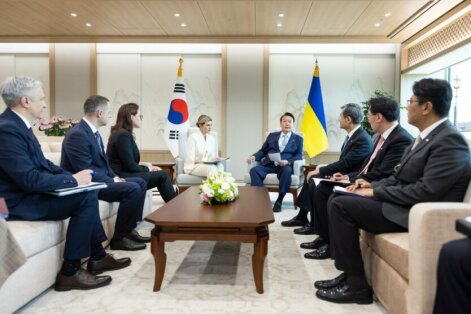
Separately, mention should be made of the foreign policy concept of the Republic of Korea "Eurasian Initiative", the main goal of which is to create a peaceful community based on economic cooperation and joint innovation. The "Eurasian Initiative" provides for multilateral economic cooperation on the territory of the Eurasian continent, within which a trans-Eurasian corridor should be formed, including main gas pipelines, a logistics, transport and energy network. Ukraine is located at the crossroads of trans-European transport logistics and has good prerequisites to become part of the corridor for the delivery of goods from the EU countries to Asian countries and the states of Northeast Asia.
Ensuring the regularity of the Ukrainian-Korean high-level political dialogue should become one of the main components of our policy towards South Korea in the political sphere. The high level of political contacts with Ukraine will be a signal to South Korean businesses about the possibility of developing economic projects and investing in our economy after the end of the war.
One of the possible tools for establishing a political dialogue could be an attempt to pay attention to the problems of South Korea, in particular, the existential threat that comes from the DPRK and the North Korean nuclear program. To date, the format of the "six-party" negotiations on the settlement of the North Korean problem has been exhausted and the need for new initiatives is obvious. Ukraine, which asks for understanding of national problems, more active support in the confrontation with Russia (which is not interpreted in South Korea as a threat to national security), could offer political and diplomatic support to Seoul and initiate a new format for resolving the problem with North Korea. Ukraine is aware of the nuances of coexistence with a nuclear neighbor, whose leadership is unpredictable and makes irrational decisions, which means that Ukraine and South Korea have a certain common denominator. The same fact gives Kyiv a fair motivation to participate in the new format of negotiations.
The two countries also have opportunities in the cultural and humanitarian sphere. Ukrainian and South Korean higher education institutions fruitfully cooperate, and student and scientific exchanges were a daily practice before the full-scale invasion of the Russian Federation into Ukraine, which would be logical to resume after the end of the war. An important element of bilateral cooperation in the field of education is the functioning of one of the leading Western educational institutions of the Republic of Korea - Hankuk University of Foreign Languages - the only faculty of Ukrainian studies in the country, where about 100 Korean students study the Ukrainian language, history and culture. Students undergo language training at the Kiev National University. Shevchenko.
South Korea implements many cultural and educational projects in Ukraine: providing free grants for teaching Ukrainian students, free teaching of the Korean language at the Korean Educational Center in Kiev, holding music festivals and competitions on the territory of Ukraine. In turn, Ukraine should use the potential of Ukrainians living and studying in South Korea to create a new and modern narrative related to the perception of Ukraine and Ukrainians, using the possibilities of social networks, local television, etc. On Vyshyvanka Day, by the way, Olena Zelenska met with representatives of the Ukrainian diaspora, which is about 2,000 people.
An important aspect of humanitarian cooperation is issues related to ethnic Koreans living on the territory of Ukraine. Before the full-scale invasion of the Russian Federation in Ukraine, there were about 35 thousand representatives of the Korean national community. Despite the fact that the majority of ethnic Koreans are well integrated into Ukrainian society, many migrants who came to Ukraine from other countries had certain problems with their legal status - the lack of Ukrainian citizenship or a permanent residence permit. About 30 thousand citizens of Ukraine are of Korean origin, which testifies to the cultural and historical ties between our countries.
Thus, Ukraine and South Korea have an impressive potential for the development of bilateral relations, which is important to reveal now - under the conservative administration of Yoon Seok-yeol, who openly supports Ukraine in the war, because in a different political scenario, if the Democrats are in power, the attitude of Ukraine, it would probably be different.





















